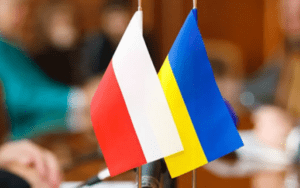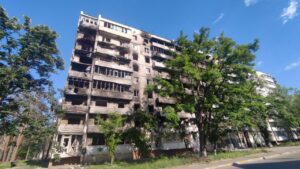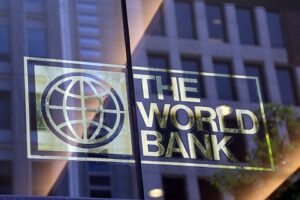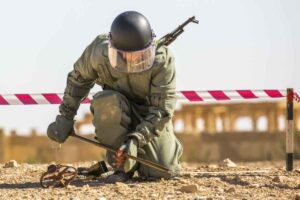
The authorities of Kyiv will assist in the restoration of cities and towns of the metropolitan agglomeration, which suffered the most during the defense of Kyiv from Russian invaders.
With such a proposal, the mayor of the capital, Vitali Klitschko, addressed the heads of local communities, the press service of the mayor reports.
“Jointly defending the capital from the Russian aggressor, we once again became convinced of the importance of our unification into the Kyiv Agglomeration Association, which we created in 2019. We united not only in the defense of Kyiv and our communities, but also in providing volunteer assistance, supporting the military and temporarily displaced citizens. I am convinced that we must join forces in rebuilding, restoring our cities and towns, housing and infrastructure for our citizens,” he said.
In this regard, Klitschko put forward a proposal to the territorial communities for help from the center of the Kyiv agglomeration – Kyiv.
“In particular, in the form of a subsidy for the restoration of facilities damaged by Russian barbarians during the hostilities in the suburbs of Kyiv in February-March 2022. Because our communities together make up a big Kyiv, and we must jointly restore and develop it,” he emphasized.

President of Ukraine Volodymyr Zelensky said that Ukraine will look for opportunities to help Poland in the energy sector and find a way out of their future energy risks in the near future.
“Today we raised important energy issues. We discussed energy challenges. We are interested that Ukraine can help Poland. We are doing everything to find a way out of their future energy risks in the near future,” Zelensky said at a press conference with Polish Prime Minister Mateusz Moravetsky and Latvian President Egils Levits in Kyiv on Friday.
He also called this issue a priority in relations with Poland.
“For us, this is a priority in our relations. Despite the fact that we have a ban on the export of coal during this difficult period, we will look for an opportunity to help Poland. Because Poland, in spite of everything, found certain steps to help us, when it was not easy for her. We understand this responsibility,” the President added.

The Institute of Eye Diseases and Tissue Therapy named after V.P. Filatov (Odesa) received medical devices and medicines as part of the Shelter Ukraine charitable initiative, which is being implemented by SiLab Ukraine, Valores Foundation, Teple Misto charitable organization, Vplyv charitable organization in cooperation with Razom For Ukraine.
The clinic told the Interfax-Ukraine agency thanks to this initiative, the institute, in particular, was able to obtain suture materials, medical devices and medicines.
The received medical devices and consumables are used, among other things, in corneal transplantation operations, said Halyna Drozhzhina, the head of the department of pathology and microsurgery of the cornea of the eye.
“Such interventions are almost always the patient’s last chance not to lose sight, and they can only be done with such tools,” she stressed.
She pointed out that during the COVID-19 pandemic and the start of the war, “people hesitated and turned to ophthalmologists at the wrong time.”
“The number of patients in need of such interventions has increased. Therefore, such assistance is extremely necessary for us, it will help prevent vision loss in dozens of patients from different parts of Ukraine,” she said.
The clinic stressed that during the war, the institute, like in peacetime, continues to provide highly specialized ophthalmological care to patients from all over Ukraine, including citizens who were evacuated from the zone of active hostilities.

During the UK-Ukrainian infrastructure summit in London, Ukraine and the UK, as well as representatives of UK business, signed a Memorandum on Ukraine’s infrastructure restoration.
The Ministry of Infrastructure of Ukraine said in a report on its website on Saturday that this memorandum provides an opportunity for UK business to fully participate in the restoration of Ukraine’s infrastructure destroyed by Russia.
In partnership with UK business, a working group has been created that will work on the restoration of the critical infrastructure of Kyiv city and the region.
“The Ministry of Infrastructure is already developing a public register of damaged infrastructure and, together with colleagues in the government and international partners, is developing solutions for digital recovery management,” Ukrainian Infrastructure Minister Oleksandr Kubrakov was quoted as saying.
According to him, now about 30% of the infrastructure in Ukraine has been destroyed.
At the same time, in the course of work on the restoration of transport communication, 41 temporary crossings have already been installed, almost 1,000 km of roads have been cleared.
The Ministry of Infrastructure said that the government of the UK, in particular, Secretary of State for Transport Grant Shapps, from the start of a full-scale invasion of Russia, provided full support in repelling aggression, restoring destroyed infrastructure and establishing supply chains in the condition of the war.

The World Bank will soon provide Ukraine with a $100 million loan to help internally displaced persons (IDPs), World Bank Regional Country Director for Eastern Europe Arup Banerji has said.
He said in an interview with Interfax-Ukraine that given the acute need for central budget financing, the World Bank is currently focusing on providing quick and immediate assistance, which, in turn, can help the population, especially the most vulnerable groups of the population. First, very soon we will allocate another $100 million to help internally displaced persons, he said.
Banerji added that the World Bank continues to provide assistance in the healthcare, infrastructure and energy sectors under existing projects.
We are also exploring opportunities for cooperation with other bilateral development partners (for example, Italy, Japan and the United States) who are very interested in attracting PEACE (Project Support to Public Expenditure to Sustainable Public Administration in Ukraine) loan and funding others types of confirmed budget expenditures, the World Bank regional director noted.
Specific items have not yet been agreed, but will certainly include additional payments to internally displaced persons and other vulnerable groups in Ukraine, Arup Banerji added.
HELP, IDPS, LOAN, WORLD BANK

Germany will help Ukraine in demining, said German Foreign Minister Annalena Berbock.
“We, like Germany, will help in demining to a greater extent. Because it is not only about military demining, where we will help you. It is also about demining in cities, villages, and doing it together so that people were able to return home,” Burbock said at a press conference with Ukrainian Foreign Minister Dmytro Kuleba in Kyiv on Tuesday.